Comprehensive Analysis of Organizational Theories and Approaches
VerifiedAdded on 2020/12/10
|11
|2574
|314
Report
AI Summary
This report provides a comprehensive overview of various organizational theories, beginning with classical and scientific management approaches, including the contributions of Frederick Taylor, Henry Fayol, and Max Weber. It then explores criticisms of these classical approaches and delves i...
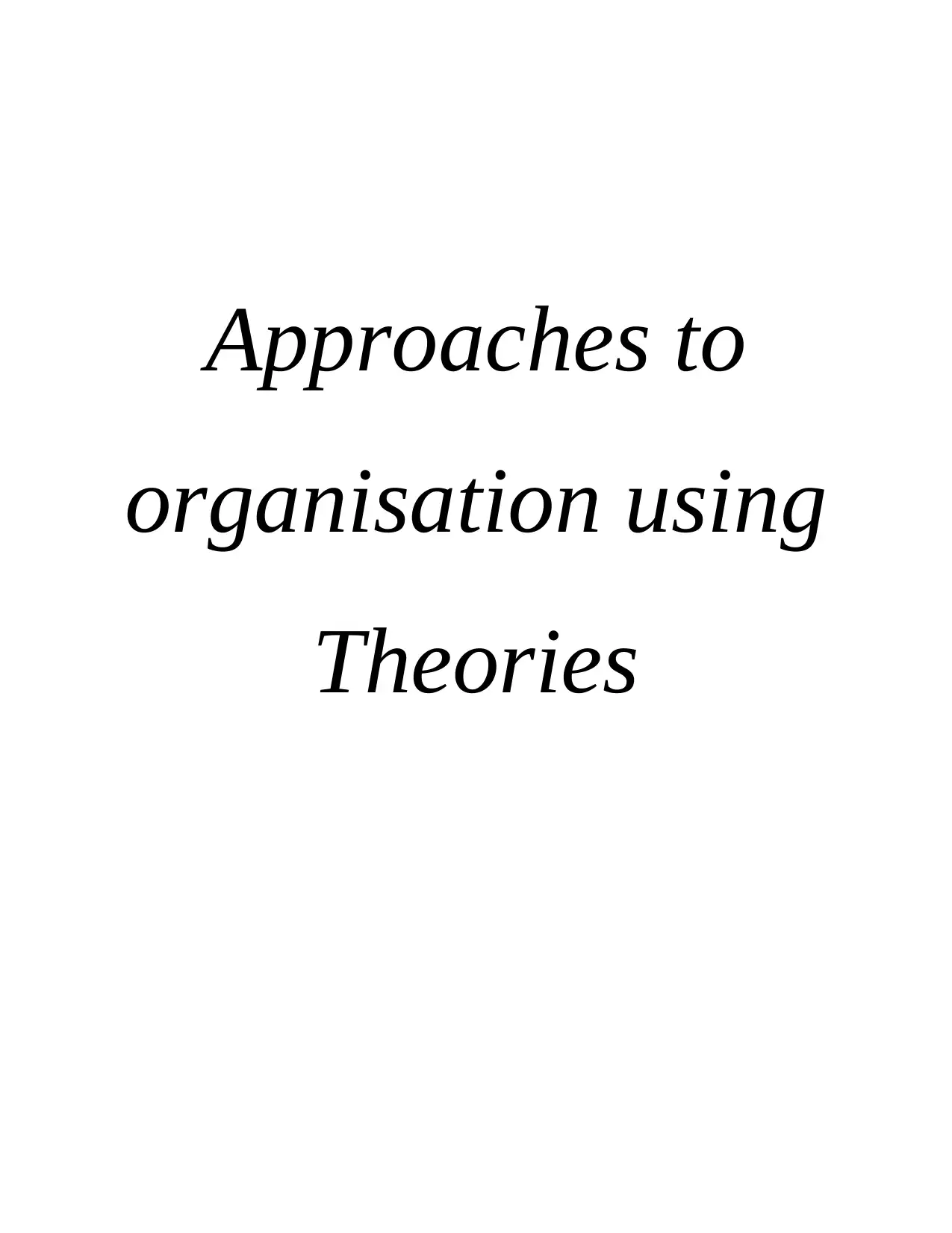
Approaches to
organisation using
Theories
organisation using
Theories
Paraphrase This Document
Need a fresh take? Get an instant paraphrase of this document with our AI Paraphraser
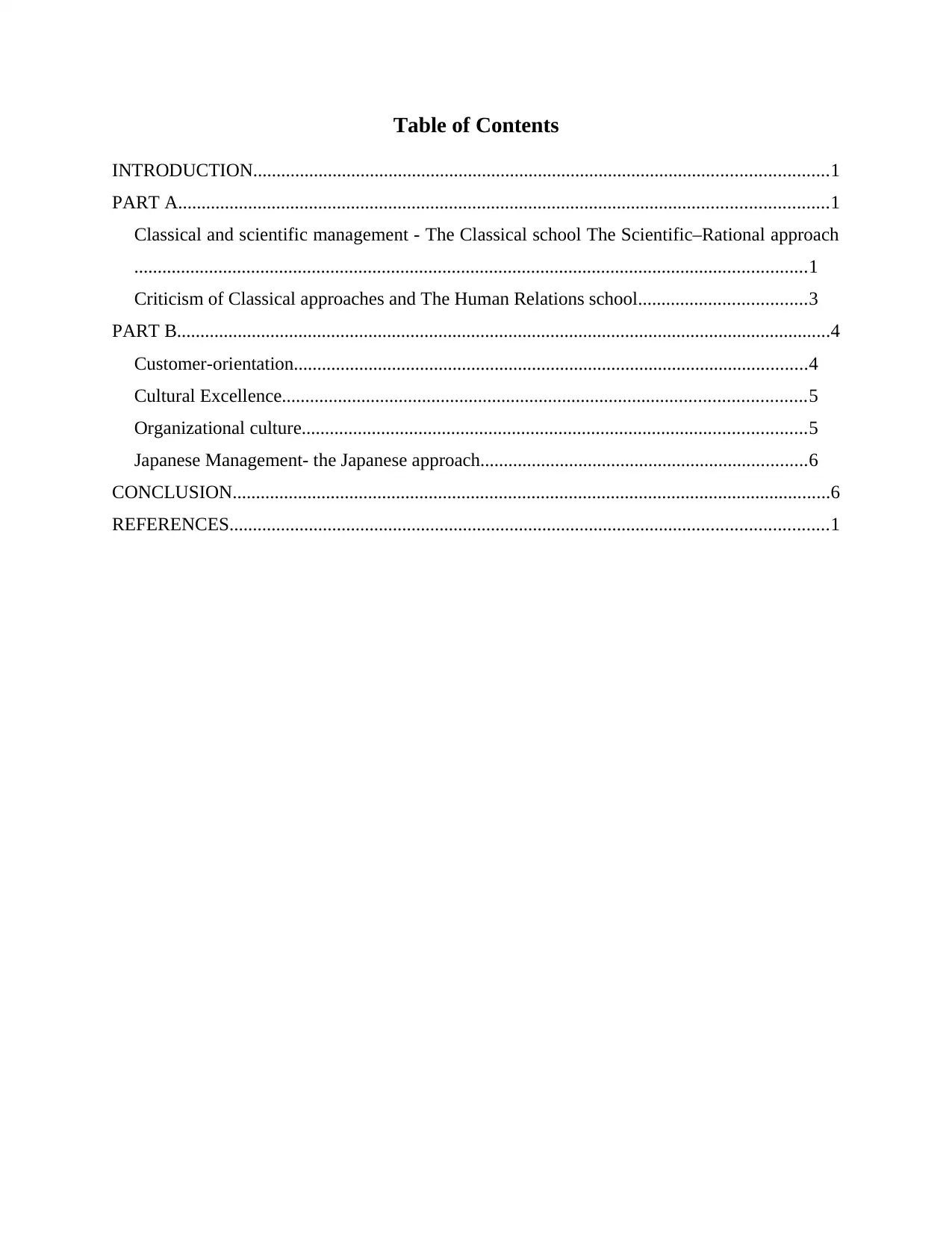
Table of Contents
INTRODUCTION...........................................................................................................................1
PART A...........................................................................................................................................1
Classical and scientific management - The Classical school The Scientific–Rational approach
................................................................................................................................................1
Criticism of Classical approaches and The Human Relations school....................................3
PART B............................................................................................................................................4
Customer-orientation..............................................................................................................4
Cultural Excellence................................................................................................................5
Organizational culture............................................................................................................5
Japanese Management- the Japanese approach......................................................................6
CONCLUSION................................................................................................................................6
REFERENCES................................................................................................................................1
INTRODUCTION...........................................................................................................................1
PART A...........................................................................................................................................1
Classical and scientific management - The Classical school The Scientific–Rational approach
................................................................................................................................................1
Criticism of Classical approaches and The Human Relations school....................................3
PART B............................................................................................................................................4
Customer-orientation..............................................................................................................4
Cultural Excellence................................................................................................................5
Organizational culture............................................................................................................5
Japanese Management- the Japanese approach......................................................................6
CONCLUSION................................................................................................................................6
REFERENCES................................................................................................................................1

You're viewing a preview
Unlock full access by subscribing today!
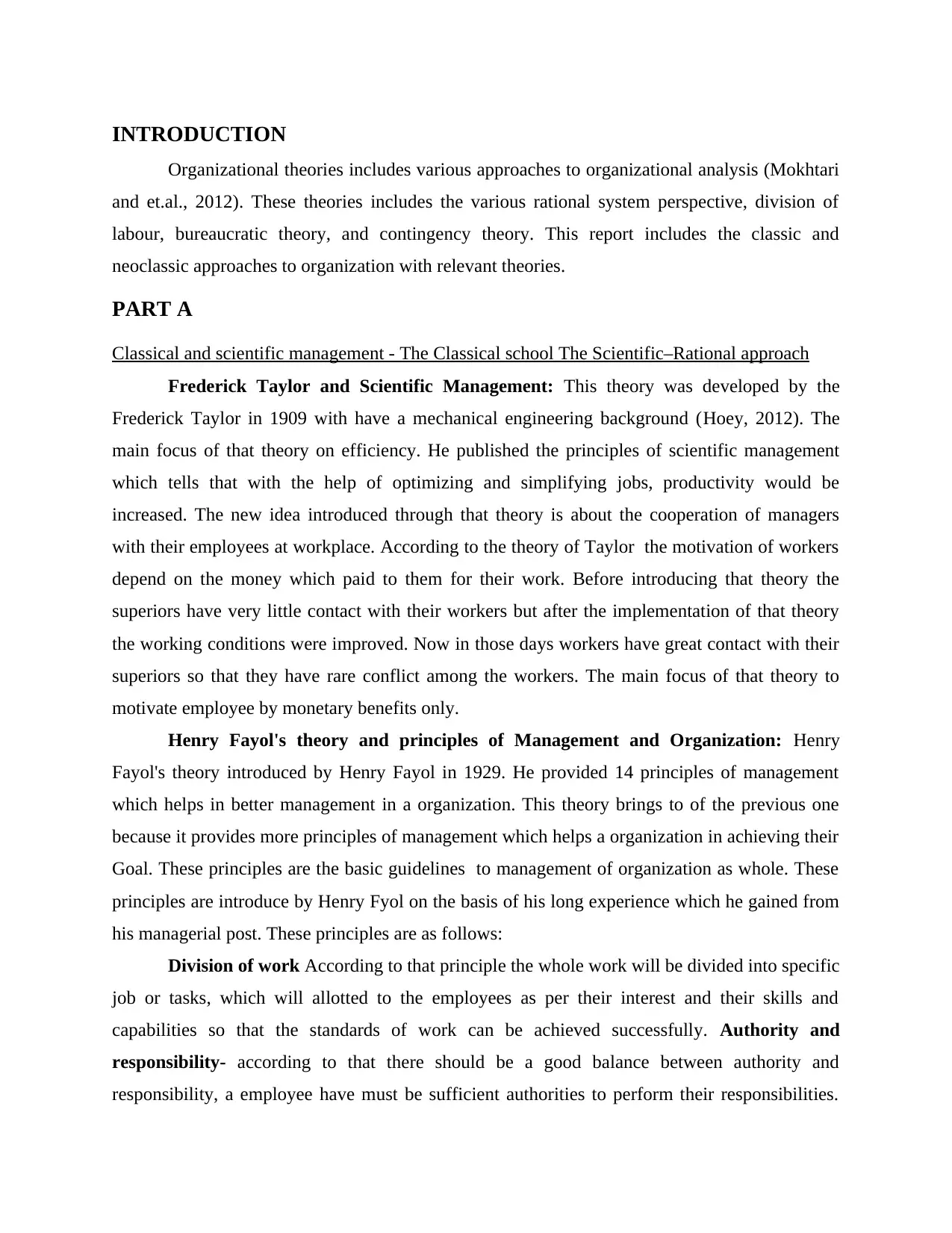
INTRODUCTION
Organizational theories includes various approaches to organizational analysis (Mokhtari
and et.al., 2012). These theories includes the various rational system perspective, division of
labour, bureaucratic theory, and contingency theory. This report includes the classic and
neoclassic approaches to organization with relevant theories.
PART A
Classical and scientific management - The Classical school The Scientific–Rational approach
Frederick Taylor and Scientific Management: This theory was developed by the
Frederick Taylor in 1909 with have a mechanical engineering background (Hoey, 2012). The
main focus of that theory on efficiency. He published the principles of scientific management
which tells that with the help of optimizing and simplifying jobs, productivity would be
increased. The new idea introduced through that theory is about the cooperation of managers
with their employees at workplace. According to the theory of Taylor the motivation of workers
depend on the money which paid to them for their work. Before introducing that theory the
superiors have very little contact with their workers but after the implementation of that theory
the working conditions were improved. Now in those days workers have great contact with their
superiors so that they have rare conflict among the workers. The main focus of that theory to
motivate employee by monetary benefits only.
Henry Fayol's theory and principles of Management and Organization: Henry
Fayol's theory introduced by Henry Fayol in 1929. He provided 14 principles of management
which helps in better management in a organization. This theory brings to of the previous one
because it provides more principles of management which helps a organization in achieving their
Goal. These principles are the basic guidelines to management of organization as whole. These
principles are introduce by Henry Fyol on the basis of his long experience which he gained from
his managerial post. These principles are as follows:
Division of work According to that principle the whole work will be divided into specific
job or tasks, which will allotted to the employees as per their interest and their skills and
capabilities so that the standards of work can be achieved successfully. Authority and
responsibility- according to that there should be a good balance between authority and
responsibility, a employee have must be sufficient authorities to perform their responsibilities.
Organizational theories includes various approaches to organizational analysis (Mokhtari
and et.al., 2012). These theories includes the various rational system perspective, division of
labour, bureaucratic theory, and contingency theory. This report includes the classic and
neoclassic approaches to organization with relevant theories.
PART A
Classical and scientific management - The Classical school The Scientific–Rational approach
Frederick Taylor and Scientific Management: This theory was developed by the
Frederick Taylor in 1909 with have a mechanical engineering background (Hoey, 2012). The
main focus of that theory on efficiency. He published the principles of scientific management
which tells that with the help of optimizing and simplifying jobs, productivity would be
increased. The new idea introduced through that theory is about the cooperation of managers
with their employees at workplace. According to the theory of Taylor the motivation of workers
depend on the money which paid to them for their work. Before introducing that theory the
superiors have very little contact with their workers but after the implementation of that theory
the working conditions were improved. Now in those days workers have great contact with their
superiors so that they have rare conflict among the workers. The main focus of that theory to
motivate employee by monetary benefits only.
Henry Fayol's theory and principles of Management and Organization: Henry
Fayol's theory introduced by Henry Fayol in 1929. He provided 14 principles of management
which helps in better management in a organization. This theory brings to of the previous one
because it provides more principles of management which helps a organization in achieving their
Goal. These principles are the basic guidelines to management of organization as whole. These
principles are introduce by Henry Fyol on the basis of his long experience which he gained from
his managerial post. These principles are as follows:
Division of work According to that principle the whole work will be divided into specific
job or tasks, which will allotted to the employees as per their interest and their skills and
capabilities so that the standards of work can be achieved successfully. Authority and
responsibility- according to that there should be a good balance between authority and
responsibility, a employee have must be sufficient authorities to perform their responsibilities.
Paraphrase This Document
Need a fresh take? Get an instant paraphrase of this document with our AI Paraphraser
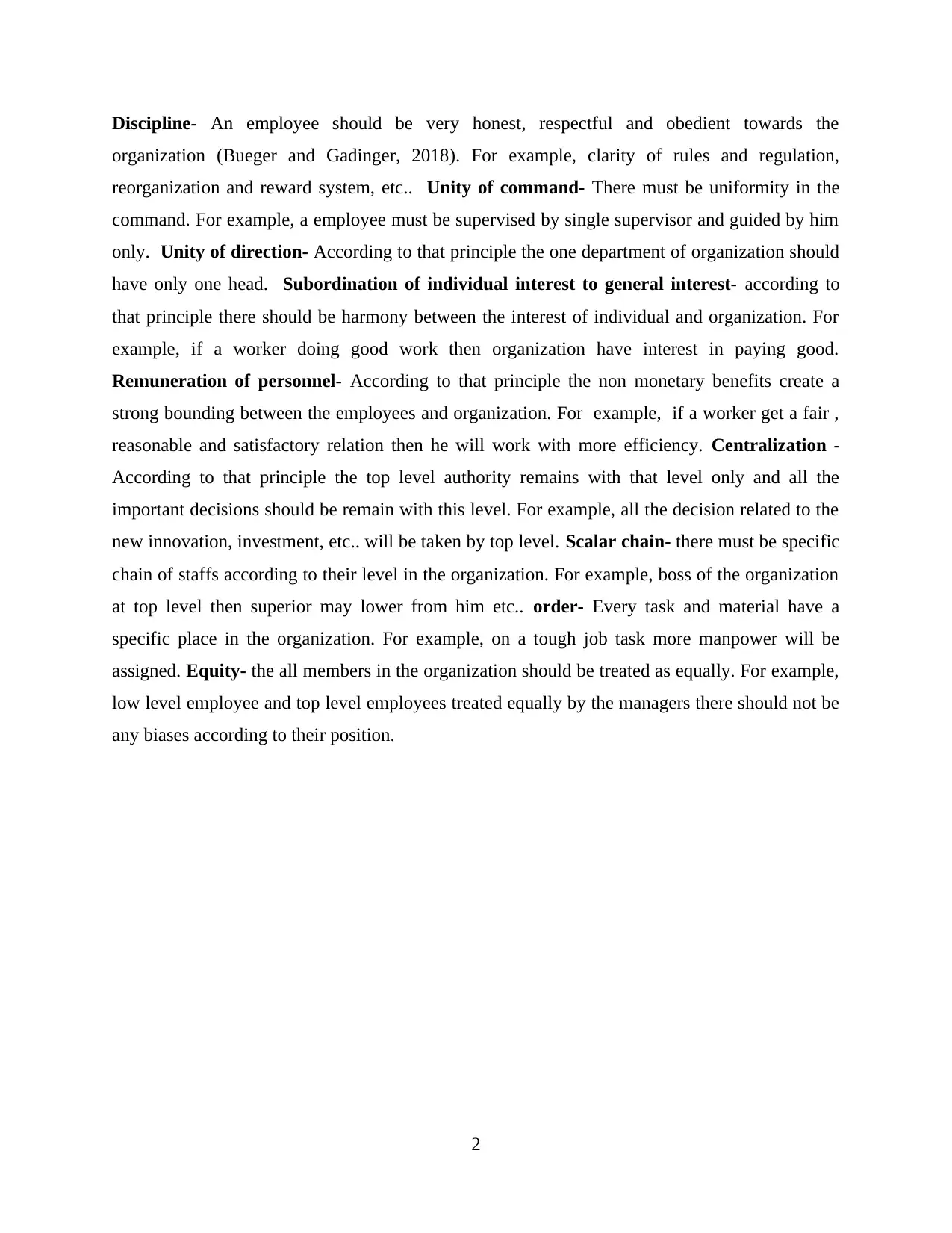
Discipline- An employee should be very honest, respectful and obedient towards the
organization (Bueger and Gadinger, 2018). For example, clarity of rules and regulation,
reorganization and reward system, etc.. Unity of command- There must be uniformity in the
command. For example, a employee must be supervised by single supervisor and guided by him
only. Unity of direction- According to that principle the one department of organization should
have only one head. Subordination of individual interest to general interest- according to
that principle there should be harmony between the interest of individual and organization. For
example, if a worker doing good work then organization have interest in paying good.
Remuneration of personnel- According to that principle the non monetary benefits create a
strong bounding between the employees and organization. For example, if a worker get a fair ,
reasonable and satisfactory relation then he will work with more efficiency. Centralization -
According to that principle the top level authority remains with that level only and all the
important decisions should be remain with this level. For example, all the decision related to the
new innovation, investment, etc.. will be taken by top level. Scalar chain- there must be specific
chain of staffs according to their level in the organization. For example, boss of the organization
at top level then superior may lower from him etc.. order- Every task and material have a
specific place in the organization. For example, on a tough job task more manpower will be
assigned. Equity- the all members in the organization should be treated as equally. For example,
low level employee and top level employees treated equally by the managers there should not be
any biases according to their position.
2
organization (Bueger and Gadinger, 2018). For example, clarity of rules and regulation,
reorganization and reward system, etc.. Unity of command- There must be uniformity in the
command. For example, a employee must be supervised by single supervisor and guided by him
only. Unity of direction- According to that principle the one department of organization should
have only one head. Subordination of individual interest to general interest- according to
that principle there should be harmony between the interest of individual and organization. For
example, if a worker doing good work then organization have interest in paying good.
Remuneration of personnel- According to that principle the non monetary benefits create a
strong bounding between the employees and organization. For example, if a worker get a fair ,
reasonable and satisfactory relation then he will work with more efficiency. Centralization -
According to that principle the top level authority remains with that level only and all the
important decisions should be remain with this level. For example, all the decision related to the
new innovation, investment, etc.. will be taken by top level. Scalar chain- there must be specific
chain of staffs according to their level in the organization. For example, boss of the organization
at top level then superior may lower from him etc.. order- Every task and material have a
specific place in the organization. For example, on a tough job task more manpower will be
assigned. Equity- the all members in the organization should be treated as equally. For example,
low level employee and top level employees treated equally by the managers there should not be
any biases according to their position.
2
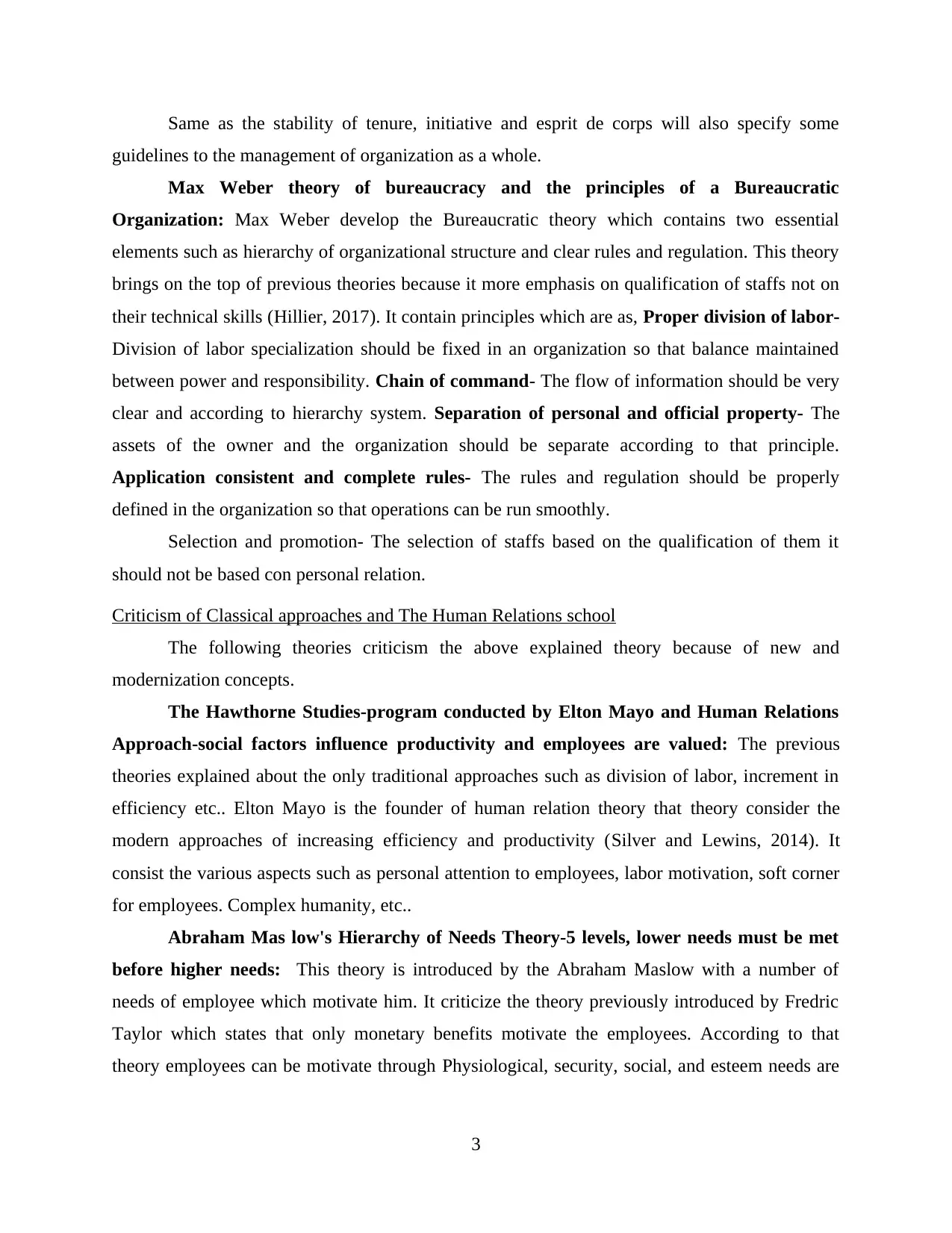
Same as the stability of tenure, initiative and esprit de corps will also specify some
guidelines to the management of organization as a whole.
Max Weber theory of bureaucracy and the principles of a Bureaucratic
Organization: Max Weber develop the Bureaucratic theory which contains two essential
elements such as hierarchy of organizational structure and clear rules and regulation. This theory
brings on the top of previous theories because it more emphasis on qualification of staffs not on
their technical skills (Hillier, 2017). It contain principles which are as, Proper division of labor-
Division of labor specialization should be fixed in an organization so that balance maintained
between power and responsibility. Chain of command- The flow of information should be very
clear and according to hierarchy system. Separation of personal and official property- The
assets of the owner and the organization should be separate according to that principle.
Application consistent and complete rules- The rules and regulation should be properly
defined in the organization so that operations can be run smoothly.
Selection and promotion- The selection of staffs based on the qualification of them it
should not be based con personal relation.
Criticism of Classical approaches and The Human Relations school
The following theories criticism the above explained theory because of new and
modernization concepts.
The Hawthorne Studies-program conducted by Elton Mayo and Human Relations
Approach-social factors influence productivity and employees are valued: The previous
theories explained about the only traditional approaches such as division of labor, increment in
efficiency etc.. Elton Mayo is the founder of human relation theory that theory consider the
modern approaches of increasing efficiency and productivity (Silver and Lewins, 2014). It
consist the various aspects such as personal attention to employees, labor motivation, soft corner
for employees. Complex humanity, etc..
Abraham Mas low's Hierarchy of Needs Theory-5 levels, lower needs must be met
before higher needs: This theory is introduced by the Abraham Maslow with a number of
needs of employee which motivate him. It criticize the theory previously introduced by Fredric
Taylor which states that only monetary benefits motivate the employees. According to that
theory employees can be motivate through Physiological, security, social, and esteem needs are
3
guidelines to the management of organization as a whole.
Max Weber theory of bureaucracy and the principles of a Bureaucratic
Organization: Max Weber develop the Bureaucratic theory which contains two essential
elements such as hierarchy of organizational structure and clear rules and regulation. This theory
brings on the top of previous theories because it more emphasis on qualification of staffs not on
their technical skills (Hillier, 2017). It contain principles which are as, Proper division of labor-
Division of labor specialization should be fixed in an organization so that balance maintained
between power and responsibility. Chain of command- The flow of information should be very
clear and according to hierarchy system. Separation of personal and official property- The
assets of the owner and the organization should be separate according to that principle.
Application consistent and complete rules- The rules and regulation should be properly
defined in the organization so that operations can be run smoothly.
Selection and promotion- The selection of staffs based on the qualification of them it
should not be based con personal relation.
Criticism of Classical approaches and The Human Relations school
The following theories criticism the above explained theory because of new and
modernization concepts.
The Hawthorne Studies-program conducted by Elton Mayo and Human Relations
Approach-social factors influence productivity and employees are valued: The previous
theories explained about the only traditional approaches such as division of labor, increment in
efficiency etc.. Elton Mayo is the founder of human relation theory that theory consider the
modern approaches of increasing efficiency and productivity (Silver and Lewins, 2014). It
consist the various aspects such as personal attention to employees, labor motivation, soft corner
for employees. Complex humanity, etc..
Abraham Mas low's Hierarchy of Needs Theory-5 levels, lower needs must be met
before higher needs: This theory is introduced by the Abraham Maslow with a number of
needs of employee which motivate him. It criticize the theory previously introduced by Fredric
Taylor which states that only monetary benefits motivate the employees. According to that
theory employees can be motivate through Physiological, security, social, and esteem needs are
3
You're viewing a preview
Unlock full access by subscribing today!
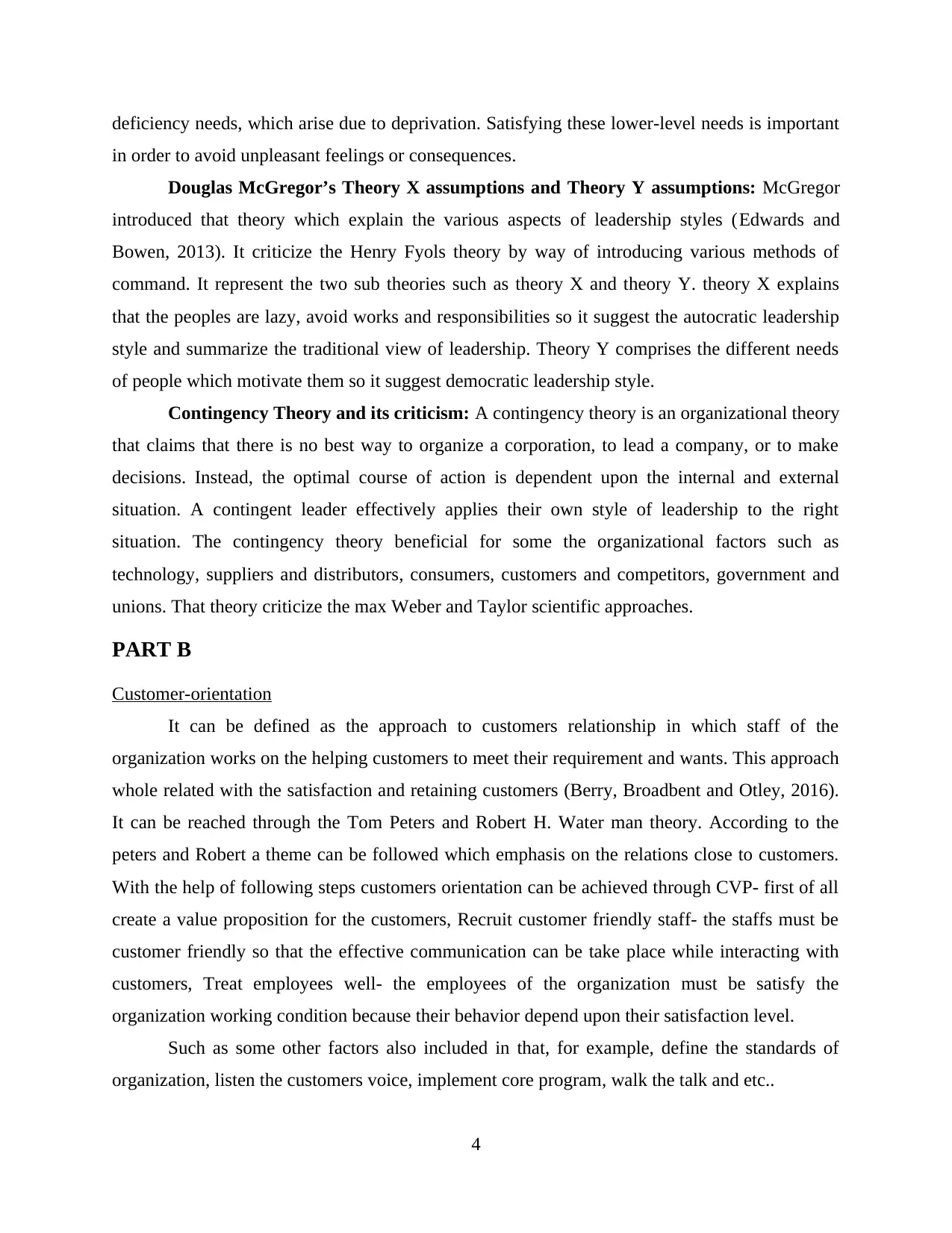
deficiency needs, which arise due to deprivation. Satisfying these lower-level needs is important
in order to avoid unpleasant feelings or consequences.
Douglas McGregor’s Theory X assumptions and Theory Y assumptions: McGregor
introduced that theory which explain the various aspects of leadership styles (Edwards and
Bowen, 2013). It criticize the Henry Fyols theory by way of introducing various methods of
command. It represent the two sub theories such as theory X and theory Y. theory X explains
that the peoples are lazy, avoid works and responsibilities so it suggest the autocratic leadership
style and summarize the traditional view of leadership. Theory Y comprises the different needs
of people which motivate them so it suggest democratic leadership style.
Contingency Theory and its criticism: A contingency theory is an organizational theory
that claims that there is no best way to organize a corporation, to lead a company, or to make
decisions. Instead, the optimal course of action is dependent upon the internal and external
situation. A contingent leader effectively applies their own style of leadership to the right
situation. The contingency theory beneficial for some the organizational factors such as
technology, suppliers and distributors, consumers, customers and competitors, government and
unions. That theory criticize the max Weber and Taylor scientific approaches.
PART B
Customer-orientation
It can be defined as the approach to customers relationship in which staff of the
organization works on the helping customers to meet their requirement and wants. This approach
whole related with the satisfaction and retaining customers (Berry, Broadbent and Otley, 2016).
It can be reached through the Tom Peters and Robert H. Water man theory. According to the
peters and Robert a theme can be followed which emphasis on the relations close to customers.
With the help of following steps customers orientation can be achieved through CVP- first of all
create a value proposition for the customers, Recruit customer friendly staff- the staffs must be
customer friendly so that the effective communication can be take place while interacting with
customers, Treat employees well- the employees of the organization must be satisfy the
organization working condition because their behavior depend upon their satisfaction level.
Such as some other factors also included in that, for example, define the standards of
organization, listen the customers voice, implement core program, walk the talk and etc..
4
in order to avoid unpleasant feelings or consequences.
Douglas McGregor’s Theory X assumptions and Theory Y assumptions: McGregor
introduced that theory which explain the various aspects of leadership styles (Edwards and
Bowen, 2013). It criticize the Henry Fyols theory by way of introducing various methods of
command. It represent the two sub theories such as theory X and theory Y. theory X explains
that the peoples are lazy, avoid works and responsibilities so it suggest the autocratic leadership
style and summarize the traditional view of leadership. Theory Y comprises the different needs
of people which motivate them so it suggest democratic leadership style.
Contingency Theory and its criticism: A contingency theory is an organizational theory
that claims that there is no best way to organize a corporation, to lead a company, or to make
decisions. Instead, the optimal course of action is dependent upon the internal and external
situation. A contingent leader effectively applies their own style of leadership to the right
situation. The contingency theory beneficial for some the organizational factors such as
technology, suppliers and distributors, consumers, customers and competitors, government and
unions. That theory criticize the max Weber and Taylor scientific approaches.
PART B
Customer-orientation
It can be defined as the approach to customers relationship in which staff of the
organization works on the helping customers to meet their requirement and wants. This approach
whole related with the satisfaction and retaining customers (Berry, Broadbent and Otley, 2016).
It can be reached through the Tom Peters and Robert H. Water man theory. According to the
peters and Robert a theme can be followed which emphasis on the relations close to customers.
With the help of following steps customers orientation can be achieved through CVP- first of all
create a value proposition for the customers, Recruit customer friendly staff- the staffs must be
customer friendly so that the effective communication can be take place while interacting with
customers, Treat employees well- the employees of the organization must be satisfy the
organization working condition because their behavior depend upon their satisfaction level.
Such as some other factors also included in that, for example, define the standards of
organization, listen the customers voice, implement core program, walk the talk and etc..
4
Paraphrase This Document
Need a fresh take? Get an instant paraphrase of this document with our AI Paraphraser
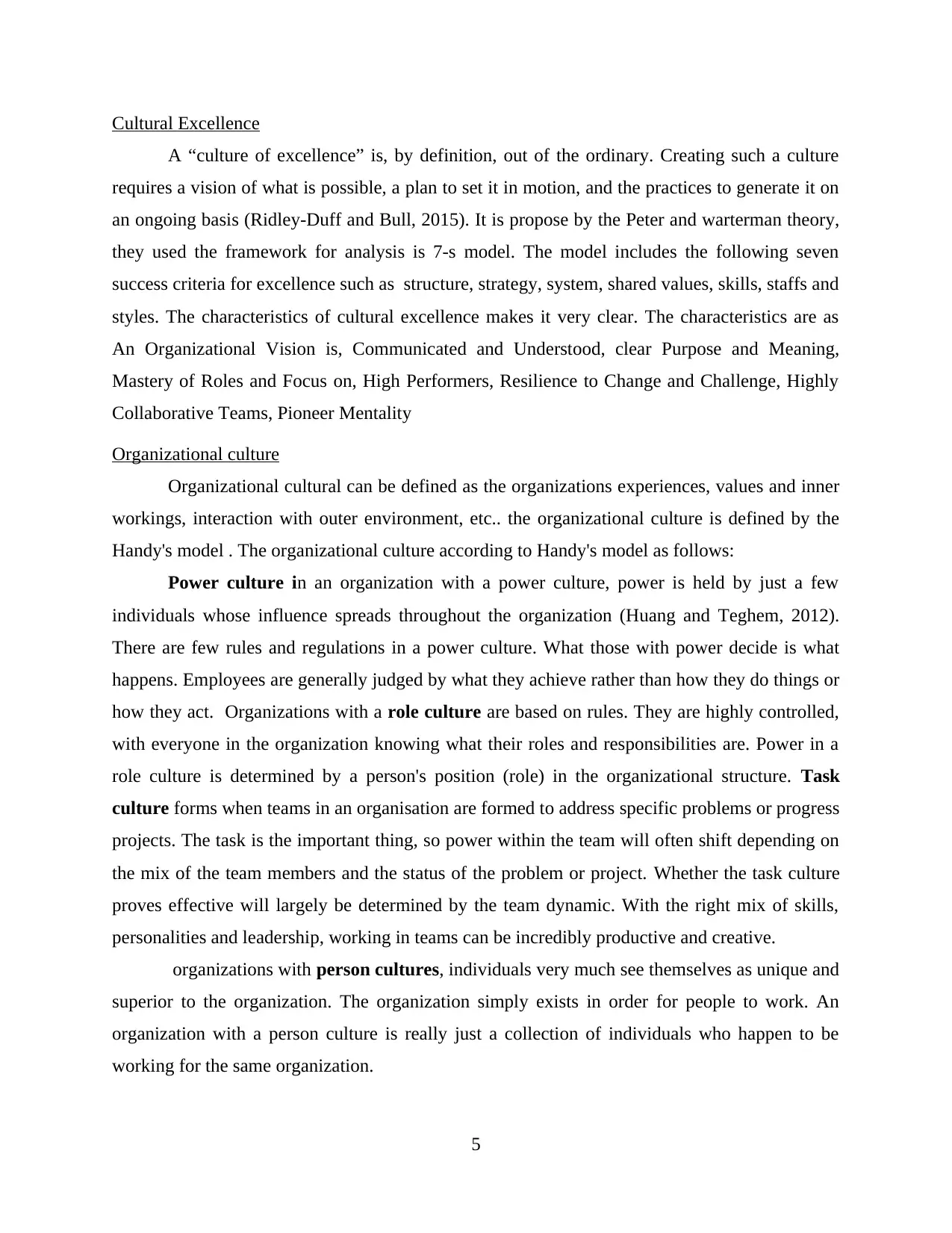
Cultural Excellence
A “culture of excellence” is, by definition, out of the ordinary. Creating such a culture
requires a vision of what is possible, a plan to set it in motion, and the practices to generate it on
an ongoing basis (Ridley-Duff and Bull, 2015). It is propose by the Peter and warterman theory,
they used the framework for analysis is 7-s model. The model includes the following seven
success criteria for excellence such as structure, strategy, system, shared values, skills, staffs and
styles. The characteristics of cultural excellence makes it very clear. The characteristics are as
An Organizational Vision is, Communicated and Understood, clear Purpose and Meaning,
Mastery of Roles and Focus on, High Performers, Resilience to Change and Challenge, Highly
Collaborative Teams, Pioneer Mentality
Organizational culture
Organizational cultural can be defined as the organizations experiences, values and inner
workings, interaction with outer environment, etc.. the organizational culture is defined by the
Handy's model . The organizational culture according to Handy's model as follows:
Power culture in an organization with a power culture, power is held by just a few
individuals whose influence spreads throughout the organization (Huang and Teghem, 2012).
There are few rules and regulations in a power culture. What those with power decide is what
happens. Employees are generally judged by what they achieve rather than how they do things or
how they act. Organizations with a role culture are based on rules. They are highly controlled,
with everyone in the organization knowing what their roles and responsibilities are. Power in a
role culture is determined by a person's position (role) in the organizational structure. Task
culture forms when teams in an organisation are formed to address specific problems or progress
projects. The task is the important thing, so power within the team will often shift depending on
the mix of the team members and the status of the problem or project. Whether the task culture
proves effective will largely be determined by the team dynamic. With the right mix of skills,
personalities and leadership, working in teams can be incredibly productive and creative.
organizations with person cultures, individuals very much see themselves as unique and
superior to the organization. The organization simply exists in order for people to work. An
organization with a person culture is really just a collection of individuals who happen to be
working for the same organization.
5
A “culture of excellence” is, by definition, out of the ordinary. Creating such a culture
requires a vision of what is possible, a plan to set it in motion, and the practices to generate it on
an ongoing basis (Ridley-Duff and Bull, 2015). It is propose by the Peter and warterman theory,
they used the framework for analysis is 7-s model. The model includes the following seven
success criteria for excellence such as structure, strategy, system, shared values, skills, staffs and
styles. The characteristics of cultural excellence makes it very clear. The characteristics are as
An Organizational Vision is, Communicated and Understood, clear Purpose and Meaning,
Mastery of Roles and Focus on, High Performers, Resilience to Change and Challenge, Highly
Collaborative Teams, Pioneer Mentality
Organizational culture
Organizational cultural can be defined as the organizations experiences, values and inner
workings, interaction with outer environment, etc.. the organizational culture is defined by the
Handy's model . The organizational culture according to Handy's model as follows:
Power culture in an organization with a power culture, power is held by just a few
individuals whose influence spreads throughout the organization (Huang and Teghem, 2012).
There are few rules and regulations in a power culture. What those with power decide is what
happens. Employees are generally judged by what they achieve rather than how they do things or
how they act. Organizations with a role culture are based on rules. They are highly controlled,
with everyone in the organization knowing what their roles and responsibilities are. Power in a
role culture is determined by a person's position (role) in the organizational structure. Task
culture forms when teams in an organisation are formed to address specific problems or progress
projects. The task is the important thing, so power within the team will often shift depending on
the mix of the team members and the status of the problem or project. Whether the task culture
proves effective will largely be determined by the team dynamic. With the right mix of skills,
personalities and leadership, working in teams can be incredibly productive and creative.
organizations with person cultures, individuals very much see themselves as unique and
superior to the organization. The organization simply exists in order for people to work. An
organization with a person culture is really just a collection of individuals who happen to be
working for the same organization.
5
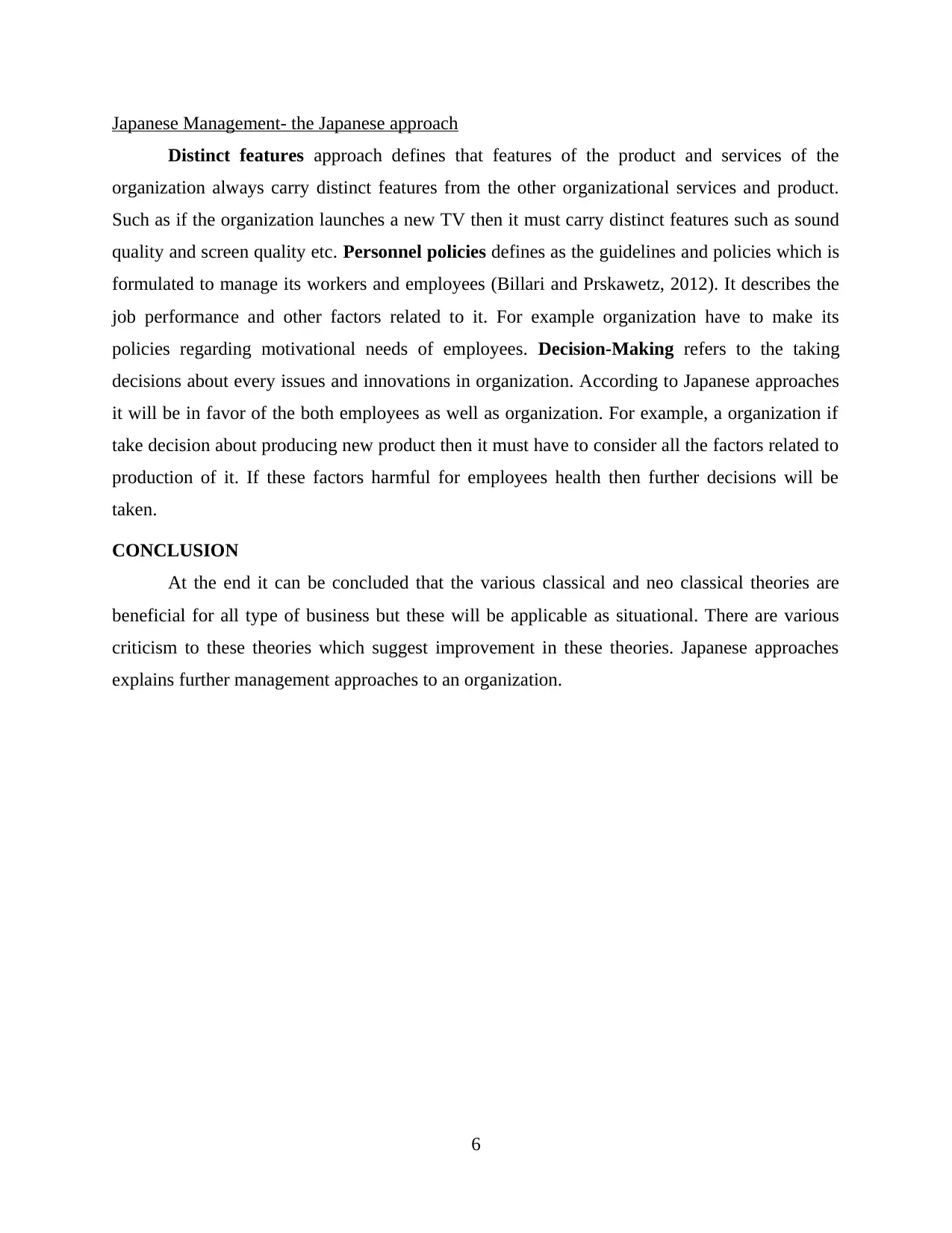
Japanese Management- the Japanese approach
Distinct features approach defines that features of the product and services of the
organization always carry distinct features from the other organizational services and product.
Such as if the organization launches a new TV then it must carry distinct features such as sound
quality and screen quality etc. Personnel policies defines as the guidelines and policies which is
formulated to manage its workers and employees (Billari and Prskawetz, 2012). It describes the
job performance and other factors related to it. For example organization have to make its
policies regarding motivational needs of employees. Decision-Making refers to the taking
decisions about every issues and innovations in organization. According to Japanese approaches
it will be in favor of the both employees as well as organization. For example, a organization if
take decision about producing new product then it must have to consider all the factors related to
production of it. If these factors harmful for employees health then further decisions will be
taken.
CONCLUSION
At the end it can be concluded that the various classical and neo classical theories are
beneficial for all type of business but these will be applicable as situational. There are various
criticism to these theories which suggest improvement in these theories. Japanese approaches
explains further management approaches to an organization.
6
Distinct features approach defines that features of the product and services of the
organization always carry distinct features from the other organizational services and product.
Such as if the organization launches a new TV then it must carry distinct features such as sound
quality and screen quality etc. Personnel policies defines as the guidelines and policies which is
formulated to manage its workers and employees (Billari and Prskawetz, 2012). It describes the
job performance and other factors related to it. For example organization have to make its
policies regarding motivational needs of employees. Decision-Making refers to the taking
decisions about every issues and innovations in organization. According to Japanese approaches
it will be in favor of the both employees as well as organization. For example, a organization if
take decision about producing new product then it must have to consider all the factors related to
production of it. If these factors harmful for employees health then further decisions will be
taken.
CONCLUSION
At the end it can be concluded that the various classical and neo classical theories are
beneficial for all type of business but these will be applicable as situational. There are various
criticism to these theories which suggest improvement in these theories. Japanese approaches
explains further management approaches to an organization.
6
You're viewing a preview
Unlock full access by subscribing today!
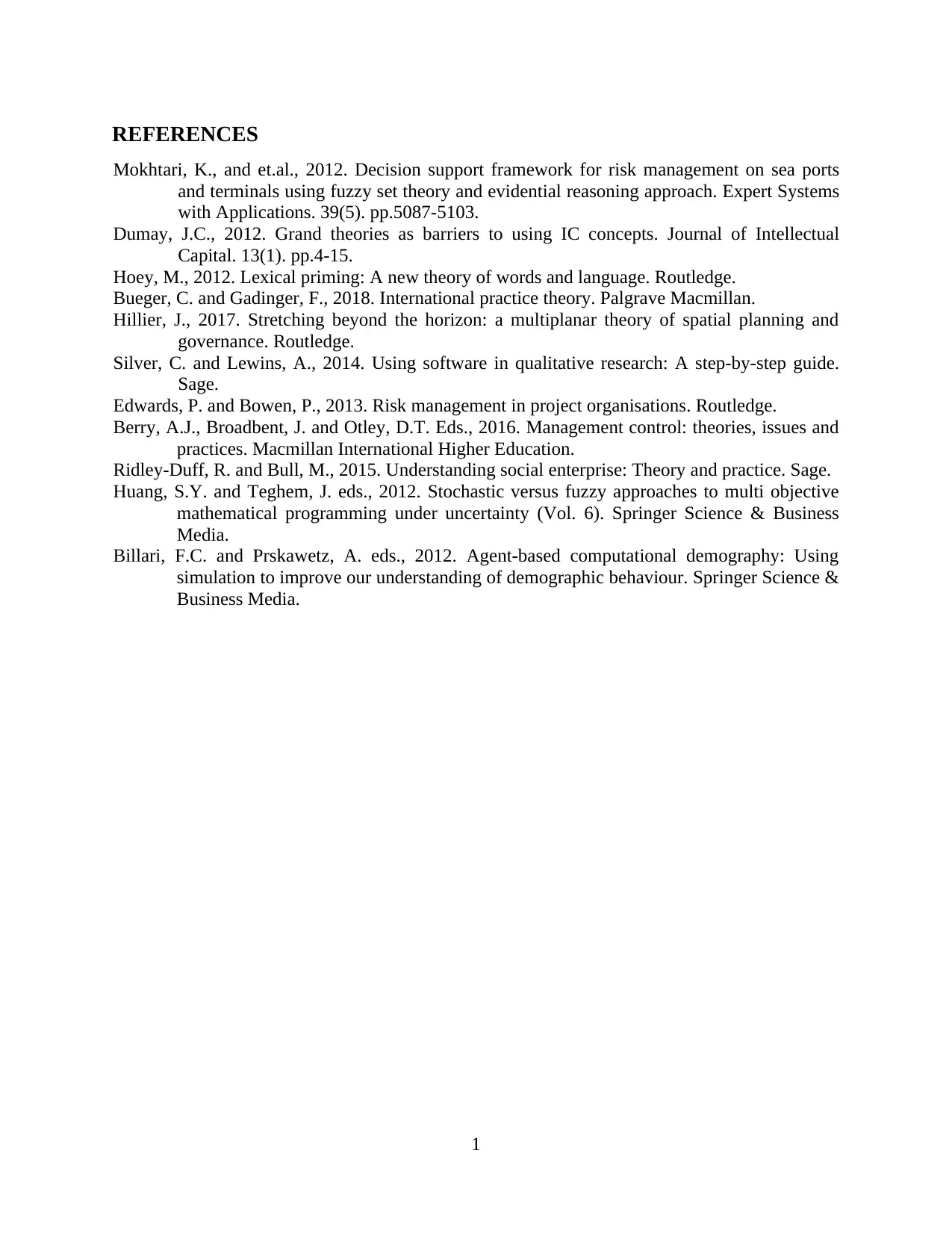
REFERENCES
Mokhtari, K., and et.al., 2012. Decision support framework for risk management on sea ports
and terminals using fuzzy set theory and evidential reasoning approach. Expert Systems
with Applications. 39(5). pp.5087-5103.
Dumay, J.C., 2012. Grand theories as barriers to using IC concepts. Journal of Intellectual
Capital. 13(1). pp.4-15.
Hoey, M., 2012. Lexical priming: A new theory of words and language. Routledge.
Bueger, C. and Gadinger, F., 2018. International practice theory. Palgrave Macmillan.
Hillier, J., 2017. Stretching beyond the horizon: a multiplanar theory of spatial planning and
governance. Routledge.
Silver, C. and Lewins, A., 2014. Using software in qualitative research: A step-by-step guide.
Sage.
Edwards, P. and Bowen, P., 2013. Risk management in project organisations. Routledge.
Berry, A.J., Broadbent, J. and Otley, D.T. Eds., 2016. Management control: theories, issues and
practices. Macmillan International Higher Education.
Ridley-Duff, R. and Bull, M., 2015. Understanding social enterprise: Theory and practice. Sage.
Huang, S.Y. and Teghem, J. eds., 2012. Stochastic versus fuzzy approaches to multi objective
mathematical programming under uncertainty (Vol. 6). Springer Science & Business
Media.
Billari, F.C. and Prskawetz, A. eds., 2012. Agent-based computational demography: Using
simulation to improve our understanding of demographic behaviour. Springer Science &
Business Media.
1
Mokhtari, K., and et.al., 2012. Decision support framework for risk management on sea ports
and terminals using fuzzy set theory and evidential reasoning approach. Expert Systems
with Applications. 39(5). pp.5087-5103.
Dumay, J.C., 2012. Grand theories as barriers to using IC concepts. Journal of Intellectual
Capital. 13(1). pp.4-15.
Hoey, M., 2012. Lexical priming: A new theory of words and language. Routledge.
Bueger, C. and Gadinger, F., 2018. International practice theory. Palgrave Macmillan.
Hillier, J., 2017. Stretching beyond the horizon: a multiplanar theory of spatial planning and
governance. Routledge.
Silver, C. and Lewins, A., 2014. Using software in qualitative research: A step-by-step guide.
Sage.
Edwards, P. and Bowen, P., 2013. Risk management in project organisations. Routledge.
Berry, A.J., Broadbent, J. and Otley, D.T. Eds., 2016. Management control: theories, issues and
practices. Macmillan International Higher Education.
Ridley-Duff, R. and Bull, M., 2015. Understanding social enterprise: Theory and practice. Sage.
Huang, S.Y. and Teghem, J. eds., 2012. Stochastic versus fuzzy approaches to multi objective
mathematical programming under uncertainty (Vol. 6). Springer Science & Business
Media.
Billari, F.C. and Prskawetz, A. eds., 2012. Agent-based computational demography: Using
simulation to improve our understanding of demographic behaviour. Springer Science &
Business Media.
1
Paraphrase This Document
Need a fresh take? Get an instant paraphrase of this document with our AI Paraphraser

2
1 out of 11
Related Documents
Your All-in-One AI-Powered Toolkit for Academic Success.
+13062052269
info@desklib.com
Available 24*7 on WhatsApp / Email
![[object Object]](/_next/static/media/star-bottom.7253800d.svg)
Unlock your academic potential
© 2024 | Zucol Services PVT LTD | All rights reserved.





